A new digital exhibition on The National Library of Wales’ website is challenging long-held beliefs about the Welsh settlement in Patagonia.
The story is often portrayed as a peaceful and harmonious meeting of cultures between the indigenous peoples and the Welsh immigrants, and the origin of a lasting friendship. But that version of history leaves out important voices –those of the indigenous communities living in Patagonia at the time and who continue to endure the consequences of land dispossession to this day.
The digital exhibition, which has been put together by Swansea University, delves in to this.
In 1865, over 150 Welsh men, women and children travelled across the Atlantic Ocean on a ship called Mimosa, dreaming of a new, better life in an area in Patagonia which is part of what is now known as the Chubut Province.
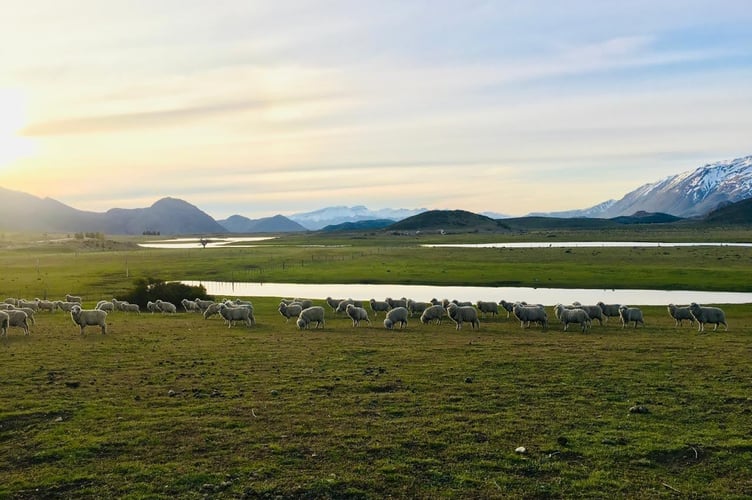
They sought to build ‘Y Wladfa’, a Welsh colony where the Welsh language and culture could not just be protected but actually flourish.
The settlers had been invited by the Argentine government, which at the time was offering land to any European families willing to relocate to the newly-established country. However, it is worth asking to what extent the lands were theirs to give away, as self-governing Tehuelche and Mapuche peoples were already calling that region home. It is clear now that the Welsh settlement was part of a broader Argentine nation-building project that actively sought to displace and dispossess indigenous peoples and assert state sovereignty.
The National Library of Wales in Aberystwyth is home to a number of diaries, letters and other documents that offer insights into the establishment of the colony and everyday life of Welsh settlers in ‘Y Wladfa’. These records almost exclusively reflect the settlers’ point of view. Indigenous accounts of how areas of the Chubut Province were settled by Welsh immigrants are missing.
For the project’s director, Dr Geraldine Lublin of Swansea University, one of the main aims was to address this underrepresentation.
Dr Lublin explains: “In Argentina, the marginalisation of indigenous experiences perpetuates the intergenerational trauma inflicted by the loss of ancestral territories, forced assimilation and other forms of violence. As well as an erosion of identity, that in turn results in emotional distress, hardship and systemic inequality.”
She goes on to note that, in Wales, this underrepresentation of indigenous perspectives results in an incomplete understanding of the impacts of Welsh settlement in Patagonia.
The digital exhibition – called ‘Problematising History' – has been launched to offer a platform for these underrepresented voices and incorporate a wider range of views about that important chapter of Welsh history. Thanks to Dr Llewelyn Hopwood’s skilful translations, visitors can access those views in English, Welsh or Spanish, although some of the works also feature a fair amount of Mapudungun, the Mapuche language.
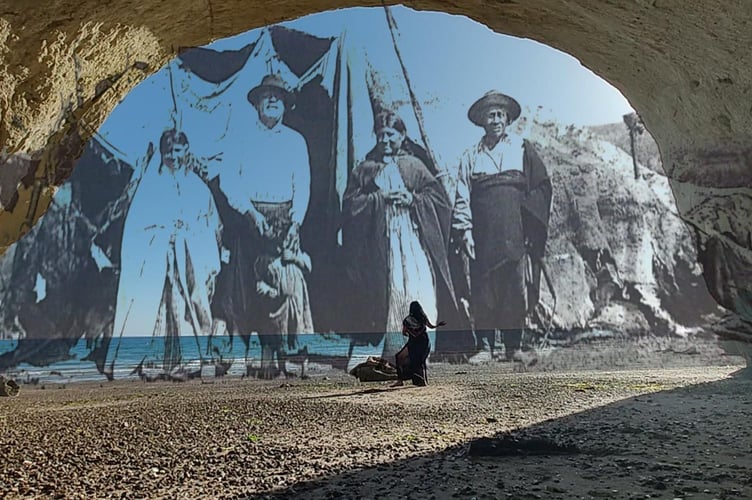
The project was funded by the Arts & Humanities Research Council Impact Acceleration Account at Swansea University. It was led by Swansea University in collaboration with The National Library of Wales, Wales Arts International and the "GEMAS" Argentine research network, whose work on subordinated and marginalised memories spans decades. Based across four different universities and various research centres in Argentina, the GEMAS partners are: Dr Mariela Eva Rodríguez (Project Co-Lead), Dr Carolina Crespo, Dr Ayelen Fiori, Dr Julieta Magallanes, Dr Ana Margarita Ramos, Kaia Santisteban, Dr Valentina Stella and Dr Marcela Tomas. The initiative also converged with Wales Arts International and the organisation’s sustained efforts during the United Nations Decade of Indigenous Languages to support artists from Wales to develop a more comprehensive understanding of how to work with indigenous cultures and languages through the Gwrando project.
The ‘Problematising History’ exhibition includes a range of creative works from Mapuche Tehuelche authors who share their own reflections on the history of Chubut and Welsh settlement. Speaking about working with these contributors, Dr Lublin explains that the team wanted to create genuine partnerships with them.
“It was exciting that the invitation for contributions was not prescriptive,” said Dr Lublin.
“Although that created quite a bit of uncertainty, it was a condition of the meaningful and considered nature of the partnerships we wanted to establish. As things turned out, the works submitted were very different, and the authors had quite different backgrounds and experiences.”
Four initiatives responded to the project’s call for creative artistic expressions. “De-mapping the feat” was authored by Ester Andrea Despó Cañuqueo and Nadia Paz Pissano Paileman. It is a creative critical project that challenges the dominant historical narrative of Welsh settlement in Patagonia by foregrounding the voices and experiences of indigenous peoples.
Developed by Mapuche Tehuelche artists and researchers, it seeks to dismantle colonial discourse and official histories that portray Welsh settlers as pioneers who “discovered” an empty land, ignoring the longstanding presence and culture of indigenous communities.
Through videoart, collage, oral testimonies and collaborative storytelling, the project reimagines maps as tools for social memory, embodied knowledge and resistance.
By connecting specific Patagonian locations with indigenous history, emotion and artistic expression, the “TAIÑ MÜLEKAN - Our presence” videoart piece offers a decolonial counter-narrative that centres indigenous agency, culture and perspectives in the face of historical erasure.
Another moving video-led project, “Memories and stories of Mapuche territory elders” was created by Agustín Pichiñan and supported by the Pichiñan lofche [community]. It brings to life the suppressed oral histories of families forced to resettle in the area of Paso de Indios (amidst the arid steppe of central Patagonia) after the violent military campaigns known as “the Conquest of the Desert” (1878-1884). Rejecting the state-backed narrative that celebrates “progress” and casts the Welsh settlers as the heroes while erasing indigenous suffering, it highlights how fences were installed on community territories and individuals were harassed and discriminated against. Recovering ancestral knowledge and collective memory, the project asserts Mapuche Tehuelche resistance, bringing the past to light via heartfelt testimonies in the video presentation.
“Puel Willi Mapu Mew: Taiñ Zungun” is a powerful performative project by Viviana Ayilef, Gerónimo Gil, Mónica Melipan and Iván Paillalaf. It brings Mapuche Tehuelche ancestral voices into the public space in a bid to draw attention to the humiliation and hurt caused by the establishment of the 3 November bank holiday in Chubut to commemorate the day when, in 1869, Cacique Casimiro Biguá and other Tehuelche and Mapuche leaders swore loyalty to the Argentine flag and affirmed their commitment to defend Argentine national territory. Presented in four structured segments combining spoken word, poetry, music and song, this performance reclaims the histories of the Huisca Antieco community and confronts the violence of dispossession, resettlement and erasure. It reflects on the sharp contrast between the prominent commemoration of Welsh settlers through bank holidays, monuments and tourist areas such as the Rifleros Trail, versus the erasure of indigenous words and memories.
Recorded at Trelew’s Memory Cultural Centre on 2 November 2023, the performance uses poetic prose, storytelling, music and song, and collective testimony to assert cultural presence and demand recognition beyond the shadows of colonial narratives.
“Nahuelpan: Memory, dispossession and struggle” is a poignant audiovisual project created by three young Mapuche Tehuelche women —Jenifer Nahuelpan, Luisa Ayleen Suárez and Gina Jara— who are members of the Nahuelpan lof [community] in Chubut. The project aims to reclaim and share the difficult history of the community through four video interviews which combine oral testimonies, images and personal narratives. Countering decades of disposession, marginalisation and silencing, the initiative underscores the importance of preserving and transmitting ancestral knowledge and teachings, reflecting a collective effort to honour the memory of the ancestors and sustain the struggle.
The exhibition also features an educational resource designed to support critical engagement with the history of Welsh settlement in Patagonia by means of activities focusing on the works showcased. The learning and teaching toolkit suggests discussion prompts and activities relating to the various multimedia materials. Inspired by the Curriculum for Wales, it encourages exploration of multiple perspectives by examining themes like colonial encounters, cultural displacement and memory. Designed to be flexible for classroom settings, it invites learners to analyse official narratives, reflect on power dynamics, and consider decolonial approaches to history and storytelling.
Conveying his greetings to the audience present at the exhibition launch on 26 June, contributor Iván Paillalaf drew attention to the profound significance of the date of the launch: “Here in Wall Mapu we are going through Wiñol Tripantü, when the cycle turns again, a time for meetings, for reflection, but also for strengthening ourselves in the face of all kinds of attacks against our rights and our integrity…This is why reaching you with our zungun, our voices, our songs, our histories, becomes extremely significant, because that is our newen, our strength.”
Representatives of the National Library of Wales say they are proud to offer a platform for stories like Iván’s to be shared.
Rhian James, Head of Digital Access and Content at the library, explains how the exhibition supports the venue’s recently published Strategy for 2025-2030 and its aim to give priority to underrepresented voices.
She said: “We are committed to preserving and developing Wales' memory in a way that is inclusive and that recognises the diverse experiences of the communities that are a part of our shared history. Sharing the stories of the indigenous communities in Patagonia, in their own words, in this exhibition is so important and helps us better understand the past and its ongoing impact.”
The National Library is working with the project to preserve the four creative works as part of the national collection so that they’re available for future generations.
Dr Lublin recognises that the perspectives shared in the exhibition can make some of us uncomfortable, as they challenge the Welsh-centric narratives we have been able to access until now. Failing to look beyond to a simplified historical narrative that celebrates the Welsh settlement as a symbol of linguistic and cultural resilience prevents us from understanding the far more complex truths of its actual role in the broader history of Patagonian settlement. This limited view not only glosses over the nuanced interactions that took place but also prevents us from grasping a crucial reality: the profound impacts of events that unfolded 160 years ago are still very real for indigenous communities today, not just lingering in a distant past. Furthermore, overlooking indigenous perspectives means ignoring indigenous agency and ongoing resistance, missing the nuances of their political strategies, their participation in trade for their own benefit and their remarkable ability to navigate and shape the changing landscape of Patagonia right up to the present day.
The ‘Problematising History’ exhibition is available to view on The National Library of Wales website: https://www.library.wales/discover-learn/external-exhibitions/problematising-history


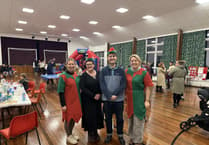
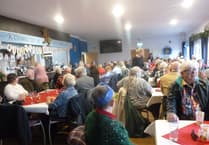
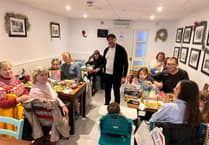
Comments
This article has no comments yet. Be the first to leave a comment.